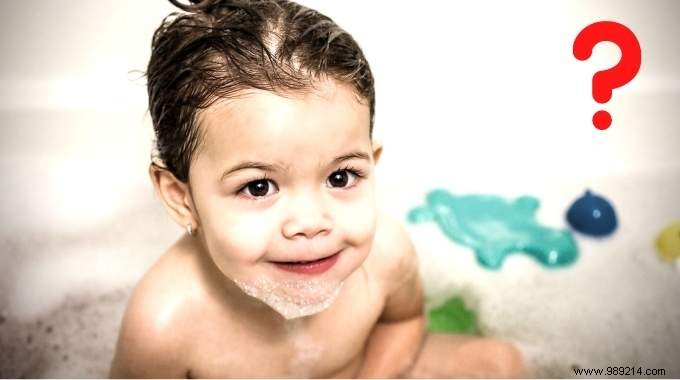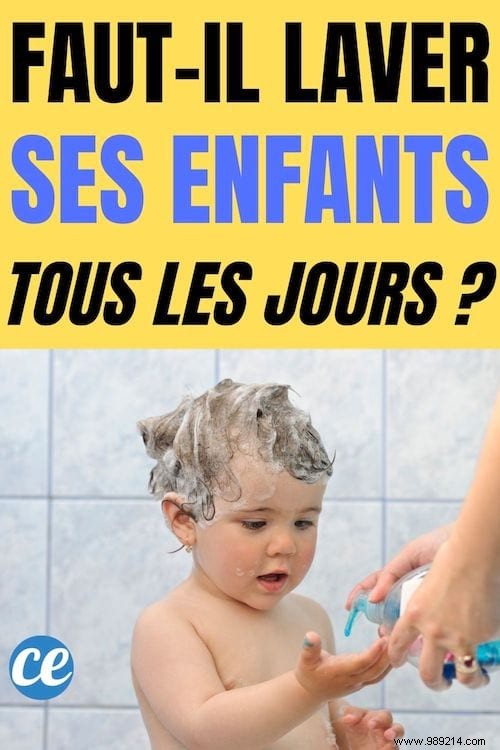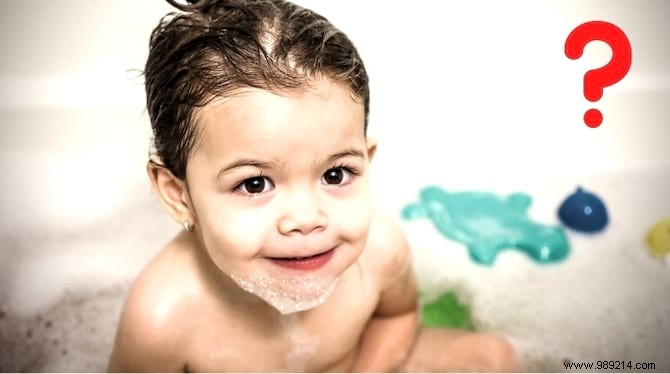
Today we're going to tackle a tricky question:
Should you bathe your children every day or not?
Because you've probably noticed... Children love to get dirty, but they hate to wash!
hello the hassle to make them take a shower! Caprices, cries, tears... They make us see all the colors.
Well, maybe it's not necessary to inflict this torment on them every day.
Experts and scientists have looked into the matter. And their answer will certainly surprise you! Watch:

First of all, you have to know what you are talking about:cleanliness or hygiene?
Having trouble telling the difference?
So, know that the daily shower is cleanliness .
It responds more to a social norm than to a real need.
You see what I mean ? It is fashionable to say that we shower every day.
We must also admit that it is pleasant and comfortable.
But from a strict point of view of hygiene and our health, it is not essential to shower every day.
Well, it's the same for children.
Stéphane Gayet is an infectious disease specialist and hygienist at the Strasbourg University Hospital.
According to him, "there is no scientific basis to assert that you should wash every day.
The shower is about cleanliness, in other words everything related to comfort and social codes", he explains.
Before specifying:"It should not be confused with the principles of hygiene , such as hand washing, which serve to prevent infections."
Dermatologists go even further.
Washing children too often can even cause problems .
As you probably know, children's skin is fragile .
And too much soap can strip the natural protection that covers it.
This is explained by dermatologist Marie-Estelle Roux:
"The skin is covered with a hydrolipidic film and like the intestine, with a skin microbiota which together protect it against pathogenic bacteria, viruses, maintain proper cell function and skin hydration".
It turns out that if you soap a child too often and with too much application, this protective veil can be eliminated.
This has the effect of weakening the epidermis.
Result, pimples, redness and other irritations can appear more easily.
And there is even worse.
Because in some countries, too much cleanliness seems to be the cause of allergies and skin diseases.
Thus, "in the Scandinavian countries where we are used to cleaning ourselves abundantly, we noticed that this caused more allergies and skin diseases".
This is explained by Alain Géloën, research director at the CNRS and author of Skin Microbiota.
And you know the icing on the cake?
According to these researchers, children living on farms or in environments exposed to bacteria during their first years of life have fewer skin problems.
What does this mean?
According to the researchers, the presence of bacteria in a child during his early years is good for his health .
They allow the child's immune system to get used to it and learn to defend itself against it.

More than frequency, our grandmothers would say it's more important to use common sense.
To put it simply, there are two areas in children that need to be cleaned every day:the private parts and the armpits.
In toddlers, a (very) regular washing of the private parts is required at least
Because pee and faeces macerate in the diaper and irritate babies' skin.
Otherwise, it is sure that baby will have red bottoms.
Hence the need for regular washing.
"In children under 2 years old, it is all the more necessary, because faeces and urine left in the diaper for too long can irritate the skin", recalls Stéphane Gayet.
For this, a gentle, soap-free cleansing oil with a neutral pH is ideal.
If you are used to using liniment, know that you can do it yourself with this easy recipe.
Then, special importance is given to the armpits . Bacteria present in sweat can give off unpleasant odors .
Indeed, "this is where the sweat glands are located.
If sweat has no smell, the bacteria present in it can produce odorous molecules", explains Alain Géloën.
So you're probably wondering how often you have to wash a child after all?
You will understand...
No need to impose a daily shower on your kids, except in certain cases.
- If it's hot, if your child has done sports , or if your toddler has spent a lot , the complete toilet is essential.
In other words, every time a child has sweated , hop in the shower without arguing!
And it is important to scrub all the little folds of the skin well.
Otherwise the accumulation of perspiration can cause irritation and mycosis.
"In the event of hot weather, if the child does not wash for more than three to four days, excessive perspiration can unbalance the microbiome, promote irritation and be accompanied by mycosis in the folds of the skin, toes and armpits," says Marie-Estelle Roux.
So even if your son doesn't want to wash after his football game, it's mandatory to shower!
- Another scenario where the shower cannot be zapped:after swimming, whether it takes place in the sea, the ocean, a lake, a river or a swimming pool.
Think about it the next time your kids go swimming.
Here's why:pathogenic bacteria can persist for up to 24 hours after swimming in the ocean. Yuck!
In any case, this is what Alain Géloën, research director at the CNRS reveals.
According to him, "an American publication in 2019 showed the presence of pathogenic bacteria after bathing in the ocean and their persistence on the skin 24 hours later. Even if the quality of the water remains monitored on the beaches, it is advisable to remain careful."
So you have to at least rinse the children with clear water , as well as the swimsuit, after swimming.
Not only do you remove itchy salt and sand...
But in addition, you eliminate bacteria and traces of chlorine or chemicals present in swimming pools.
Same story from the side of the American Academy Of Dermatology.
It is not essential to wash your children thoroughly every day.
It really all depends on their age and activities.
According to the American institution, children under the age of 6 do not need to be bathed thoroughly every day unless they have become particularly dirty.
Children aged 6 to 11 do not need a daily bath (or shower).
Once or twice a week is usually enough.
Teenagers should be more vigilant about their hygiene and take a good daily shower.
On the other hand, the private parts and the armpits must do at least a small daily cat toilet, regardless of age.
Let's remember the cases when children can not derogate from the shower:
When it's hot, after sports, after a lot of exercise or after swimming.
And the hair, will you tell me?
In children, the sebaceous glands of the scalp are not yet developed.
So, just wash them when they are dirty at the same time as the rest of the body .
Before two years, a shower gel suitable for babies is suitable.
If baby screams when you wash her hair, you can try this simple trick.
After two years, you can choose a very mild shampoo.
See for yourself...
Children generally love to splash around in their bath.
But watch out!
As Stéphane Gayet explains, "if you stay in the bath for a long time, the skin macerates and becomes more permeable to toxin residues from the mains water, describes the doctor.
The bathtub also promotes the resuspension of bacteria in the perineal region and can help unbalance the skin microbiota."
In simple terms, if you take a bath without having showered before, you macerate in your dirt!
A shower is therefore more efficient, faster, but also more ecological !
But in any case, do not forget that the toilet should be a pleasant moment of relaxation.